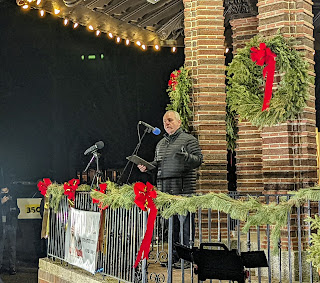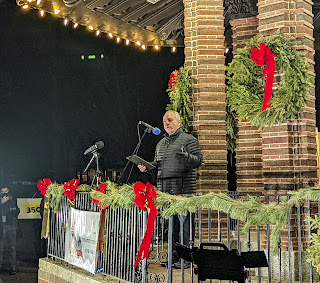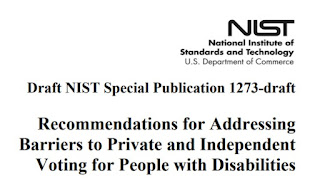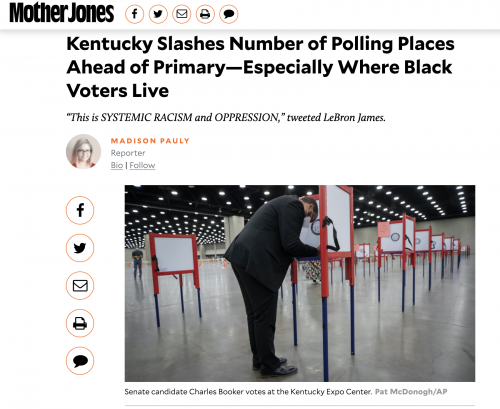 |
| Voting in Franklin, MA |
Providing accurate and timely information about what matters in Franklin, MA since 2007. * Working in collaboration with Franklin TV and Radio (wfpr.fm) since October 2019 *
Sunday, April 27, 2025
Voting in Franklin, MA
Tuesday, June 18, 2024
Voices of Franklin: KP Sompally calls for Inclusive Voting Rights for local elections
- Inclusivity: All residents, regardless of citizenship, contribute to the school system and should have a say in its budget.
- Fair Representation: Ensuring that more than 150 legal taxpayers have the right to vote on school budget issues will reflect a fair and just community.
- Community Strength: Inclusive voting rights will strengthen community bonds and ensure that all voices contribute to the future of Franklin Town's educational system.
I want to clarify my request from yesterday because some of you sent me upset emails. I am totally against illegal non-citizens being able to vote in elections. I was requesting to let legal residents, who are paying taxes and obeying the law just like us, vote in municipal elections especially for the school budget issues. These residents are permanent residents in immigration terms. Several towns in Massachusetts have requested this change, but none have had legislation passed. Again, thanks for understanding.
 |
| https://malegislature.gov/ |
https://www.franklinmatters.org/2011/03/introducing-voices-of-franklin.html
 |
| Voices of Franklin: KP Sompally calls for Inclusive Voting Rights for local elections |
Wednesday, October 11, 2023
Local Elections - Tabulator/Ballot testing scheduled for Oct 18 at 10 AM
Nancy Danello, CMC
Monday, November 7, 2022
Voting in Franklin on Nov 8, 2022
- The polls are open on election day from 6 AM to 8 PM at the Franklin High School on Oak St
- At the check-In table tell the poll worker your name first, followed by your street number and street name
- If your name does not appear on the list the poll worker will send you to the Town Clerk's table
- To cast your vote in Franklin follow the voting instructions by filling in the oval circle next to the name you wish to vote for. If you need assistance, you may bring someone to assist you or ask a poll worker to provide confidential, non-partisan help
 |
| Voting in Franklin on Nov 8, 2022 |
Monday, October 24, 2022
60 Minutes: "Dominion Voting Systems CEO speaks out against conspiracy theories" (video)
"Can you flip votes in the computer system? Can you add votes that did not exist?" Anderson Cooper asks Dominion Voting Systems CEO John Poulos. "Absolutely not," Poulos says. See the interview, Sunday on 60 Minutes.
- paper ballot based
- the voter registration system is a closed network (not part of Internet)
- highly secure
Saturday, April 30, 2022
MA Senate to Debate Work and Family Mobility Act Next Thursday (5/05/22)
Senate to Debate Work and Family Mobility Act Next Thursday
The Massachusetts State Senate announced plans today (4/28/22) to debate An Act Relative to Work and Family Mobility at a formal session next Thursday, May 5, 2022. The Work and Family Mobility Act, filed by Senators Brendan Crighton and Adam Gomez, would allow Massachusetts residents who lack federal immigration status to apply for a Massachusetts standard driver's license, the non-REAL ID license.
The bill, which received a favorable report from the Senate Committee on Rules earlier today, has received widespread support from members of the law enforcement community, advocacy groups, and members of the immigrant community. It proposes strict identity documentation criteria, asking for applicants to present two valid, unexpired identity documents. It makes no change to existing law requiring that all driver's license applicants prove that they live in the Commonwealth. The bill advanced by the Senate Committee on Rules is nearly identical to the version that previously passed the House of Representatives earlier this year.
"As the granddaughter of immigrants, I have been a longtime supporter of allowing everyone, regardless of immigration status, to safely get to work and school, access health care, and participate in the lives of their communities, and so I am pleased to see this bill move forward today," stated Senate President Karen E. Spilka (D-Ashland). "All our residents and their families deserve to feel safe, and driver's licenses for qualified individuals is good for our economy, our families, and public safety. I'd like to thank Senators Crighton, Gomez and Lovely for their efforts to push this bill forward."
"I am proud to work with my Senate colleagues to favorably move the Work and Family Mobility Act out of the Senate Committee on Rules today," said State Senator Joan B. Lovely (D-Salem). "This legislation will improve public safety on our roadways and provide accessibility for all Massachusetts residents. Thank you, Senate President Spilka and Senators Crighton and Gomez for your leadership on this bill."
"The Work and Family Mobility Act will make our roads safer and, just as importantly, make the lives of more than 185,000 Massachusetts immigrants without status easier by allowing them to earn a standard driver's license," said State Senator Brendan P. Crighton (D-Lynn). "In the absence of a robust regional public transportation system, it is impossible for many Massachusetts residents to get through their day without the use of a car. No one should fear detention or deportation over essential everyday tasks such as getting to work, school, doctor's appointments and grocery stores. It is time for Massachusetts to join the 16 other states who have passed this common-sense legislation."
"This important piece of legislation, which is long overdue, has received widespread support from law enforcement officials, municipal leaders, and advocacy organizations across our state," said State Senator Adam Gomez (D-Springfield). "These people are our neighbors, our friends, and our fellow community members. It's past time that we provide them with the ability to have reliable and accessible transportation where they don't have to fear deportation or separation from their families. This legislation gives undocumented residents the same opportunities that their documented counterparts may take for granted — the ability to drive freely across our state, find work in another community, drive their kids to school, run errands for their partner — not burdened with the worry that they may have negative interactions with law enforcement. That's what happens when people have access to reliable transportation: they can thrive, serve their communities, and succeed."
"There is a reason so many law enforcement leaders support this legislation, including a majority of my fellow sheriffs," said Middlesex Sheriff Peter J. Koutoujian. "I first spoke in favor of this issue as a state representative over 20 years ago. This bill would not only improve public safety by increasing the number of properly identified and insured motorists; but just as critically it will improve a family's ability to get to medical appointments, to the grocery store, and to their kids' school activities. I commend Senate President Spilka, Senators Brendan Crighton and Adam Gomez, as well as the numerous legislators and advocates who have continued to support this vital issue."
In a formal statement, the leaders of the organizations co-chairing the Driving Families Forward Coalition, Brazilian Worker Center Executive Director Lenita Reason and 32BJ SEIU Executive Vice President Roxana Rivera said, "As co-chairs of the Driving Families Forward Coalition, made up of over 270 endorsers including business associations, labor unions, immigrant advocates, faith groups and many more supporting the Work and Family Mobility Act, we are overjoyed that the bill will be coming before a historic Senate vote. We extend our gratitude to Senate President Spilka, Senator Lovely, Chair of the Senate Committee on Rules and our bill lead sponsors, Senator Crighton, and Senator Gomez for their leadership in promoting everyone's safety in the Commonwealth by moving the bill through the legislative process. This includes law enforcement officials who need to know drivers' identities, Massachusetts motorists who benefit when every driver is tested and insured, and, of course, the diverse immigrant communities across the state who need to access doctor's offices, schools, and jobs. Many immigrants' lives would be transformed by this bill, and everyone in Massachusetts would have safer and more secure roads for it."
The legislation also includes layered protection for driver information, prohibiting the Massachusetts RMV from keeping records of citizenship or immigration status for standard license holders and applicants. Safeguards are also put in place for voting, above and beyond the extensive existing protections, directing the Registry of Motor Vehicles and Secretary of State to establish procedures to ensure that drivers without lawful immigration status are not erroneously registered to vote.
 |
| MA Senate to Debate Work and Family Mobility Act Next Thursday (5/05/22) |
Sunday, January 16, 2022
Senator Becca Rausch’s Mid-Session Beacon Hill Review
As your voice and advocate in the State Senate, I am very proud to share several 2021 accomplishments, including a robust COVID-19 response, billions of dollars invested into our communities, and the advancement of critically needed reforms through the legislative process on Beacon Hill.
Safety for You and Your Family: My top priority has been advocating for measures that keep you and your family safe and stable throughout this public health crisis. Last year alone, my team and I helped more than 500 constituents access government benefits and supports, including unemployment assistance and food security. I also hosted monthly virtual office hours, senior coffees, and two youth legislative forums to remain accessible to constituents through the ups and downs of this pandemic.
In addition to crafting and advocating for school masking legislation and the COVID-19 Vaccine Equity Act, I also worked in partnership with public health experts, community organizations, and my legislative colleagues to pressure the Baker Administration to implement policies to keep our communities safe and local economy afloat through this crisis. Our achievements included universal masking in all K-12 schools, paid time off for families and caregivers taking children to COVID-19 vaccination appointments, implementing a COVID vaccine pre-registration system for mass vaccination sites, and delivering a multi-pronged COVID-19 Action Plan to the Governor.
Safety during these difficult times also means addressing violence and discrimination. Amid the rise of conspiracy theories and disinformation about vaccines and COVID-19, we have also seen an alarming spike in antisemitism, racism, and xenophobia on social media, in our public schools, and from elected officials. It is our collective responsibility to call out hate and injustice whenever we see it. I collaborated with Robert Trestan, Executive Director of ADL New England, to pen a GBH commentary piece explaining the rise in antisemitism within the antivax movement here in Massachusetts and across our nation. As your State Senator, I have publicly condemned abject acts of hate, offered to engage in constructive dialogue in communities, secured tens of thousands of dollars to fund diversity, equity, and inclusion work in our district, and voted to support the Genocide Education Act, now law, which requires that genocide education be taught in Massachusetts public schools before the end of high school. Unfortunately, COVID-19 is not the only pandemic we’re up against.
Funding Our Communities’ Recovery: The Legislature passed a $4 billion bill to allocate federal American Rescue Plan Act (ARPA) funds to equitably invest in our continued recovery from the COVID-19 crisis. This bill delivers broad spectrum supports for our communities’ health, including mental and behavioral health, housing security, our environment, and workforce development. I secured numerous amendments to support our district and the Commonwealth at large, including targeted funding to assist women re-entering the workforce, providing post-traumatic stress care for medical personnel, and $1,000,000 in investments for local housing, transportation, water infrastructure, and other projects in our district.
I secured several victories in the FY 2022 budget as well, including $500,000 for local projects across our district, a pilot program for a statewide youth mental health support text line, funding for the Department of Public Health to hire personnel with expertise in combatting vaccine hesitancy, and funding for New Hope’s new domestic violence shelter and an updated facility for the Attleboro Center for Children.
Legislative Victories: The gears of the legislative process are turning, and many bills are moving through their respective committees. Committees must take action on every timely filed bill by February 2, 2022, so we can expect an increase in floor votes and legislation headed to the governor’s desk in the coming months.
My Senate colleagues and I have already advanced some game-changing bills. In October, we passed comprehensive election reform legislation, strengthened by adoption of several amendments I filed. The bill provides election day voter registration, permanent mail-in voting, improved jail-based voting access, and upgrades to our elections infrastructure. My amendment work also elevated issues still left to address, like ballot drop box ratios and paid time off for voting. We also passed the Mental Health ABC Act to improve access to culturally competent care, support and boost our Commonwealth’s mental health care workforce, reduce barriers to emergency treatment, and more. This month, we again passed a bill to make government-issued IDs more accessible to people experiencing homelessness to facilitate access to critically needed services across our Commonwealth. These bills now await action by the House.
As Senate Chair of the Joint Committee on Environment, Natural Resources and Agriculture (ENRA), I also worked to pass the law that improves conditions for egg-laying hens while keeping our egg supply available and affordable.
Moving Forward: There is still so much work to be done. This session I filed more than 40 bills designed to advance election reform, good governance, public health, reproductive justice, climate action, and intersectional justice and equity. This month, my lead climate action legislation cleared the Joint Committee on Telecommunications, Utilities, and Energy, and I anticipate more favorable reports on my bills in the coming weeks. My team and I continue working hard on your behalf to shepherd these bills through the legislative process.
It is my great honor to represent the Norfolk, Bristol and Middlesex District in the Massachusetts State Senate, and I’ll continue putting my proven leadership to work for you. Please reach out to me if you need assistance, have thoughts on policy, or want to check in. My office phone number is 617-722-1555, my email is becca.rausch@masenate.gov, and you can sign up for a personal office hours appointment at beccarauschma.com/office-hours. I also invite you to join me for my district-wide virtual town hall conversation on Monday, January 24 at 7 PM (sign up at www.beccarauschma.com/town-hall).
As we begin 2022, I wish you and your loved ones strength, health, resilience, and joy. I look forward to everything we will accomplish together this year.
Senator Becca Rausch represents the Norfolk, Bristol and Middlesex District, comprised of Attleboro, Franklin, Millis, Natick, Needham, Norfolk, North Attleborough, Plainville, Sherborn, Wayland, Wellesley, and Wrentham. Senator Rausch serves as the Senate Chair of the Joint Committee on Environment, Natural Resources, and Agriculture and the Senate Vice Chair of the Joint Committee on State Administration and Regulatory Oversight.
 |
| Senator Rausch to host Virtual Town Hall - Jan 24, 2022 - Register now to participate! |
Sunday, January 9, 2022
FM #691 - January 6 Vigil (on the Town Common) - 01/06/22 (audio)
FM #691 = This is the Franklin Matters radio show, number 691 in the series.
This session of the radio show shares the audio recording of the Jan 6 VIgil held on Thursday, Jan 6, 2022 on the Franklin Town Common. The vigil was organized by the Committee to Protect Our Democracy (CPOD), a subgroup of the Franklin Democratic Town Committee, as part of remembrances scheduled across the country.
The master of ceremony Justin Bates introduces all the speakers.
The recording of the vigil runs about 45 minutes. Audio file -> https://franklin-ma-matters.captivate.fm/episode/fm-691-jan-6-vigil-01-06-22
--------------
The text of the remarks by State Representative Jeff Roy can be found ->
https://jeffreyroy.com/2022/01/07/remarks-at-jan-6-vigil-in-franklin/
Milford Daily News/Wicked Local coverage of the event can be found ->
Photos of the event can be found in one album -> https://photos.app.goo.gl/T7zBkexGeqhjZqmw5
--------------
We are now producing this in collaboration with Franklin.TV and Franklin Public Radio (wfpr.fm) or 102.9 on the Franklin area radio dial.
This podcast is my public service effort for Franklin but we can't do it alone. We can always use your help.
How can you help?
If you can use the information that you find here, please tell your friends and neighbors
If you don't like something here, please let me know
Through this feedback loop we can continue to make improvements. I thank you for listening.
For additional information, please visit Franklinmatters.org/ or www.franklin.news/
If you have questions or comments you can reach me directly at shersteve @ gmail dot com
The music for the intro and exit was provided by Michael Clark and the group "East of Shirley". The piece is titled "Ernesto, manana" c. Michael Clark & Tintype Tunes, 2008 and used with their permission.
I hope you enjoy!
------------------
You can also subscribe and listen to Franklin Matters audio on iTunes or your favorite podcast app; search in "podcasts" for "Franklin Matters"
 |
| Rep Roy giving his remarks at the January 6 Vigil (on the Town Common) |
Saturday, January 8, 2022
State Representative Jeffrey N. Roy: Remarks at Jan 6 vigil in Franklin
"Remarks at Jan. 6 vigil in Franklin https://t.co/IDvOlgjVtS"Shared from Twitter: https://twitter.com/jeffroy/status/1479418690005348353
"As Senator Rausch indicated, our day in the Massachusetts Legislature started with finishing the work of the 191st General Court on January 5, 2021.
We passed multiple pieces of legislation on the final day of the session. This work included wide-ranging pieces of legislation, including one early item that was a resolution for Franklin’s Frank Liotta, on the occasion of his 90th birthday. Another piece that passed around 2 AM was a law I had been working on for two years on the prevention of campus sexual violence.
We worked until around 5:00 AM on January 6, and I finally went to bed exhausted to get some sleep."
Audio of the event will be ready for publication and sharing this weekend. Franklin TV also captured a video recording. When that is ready for airing, I'll share the schedule.
 |
| State Representative Jeffrey N. Roy: Remarks at Jan 6 vigil in Franklin |
Sunday, December 26, 2021
How the Media Covered Voting Rights in 2020
|
Tuesday, December 14, 2021
We Did It For You! Women's Journey Through History = Dec 14, 7 PM
There was a time when women couldn’t have jobs and had no voting rights. Women were property passed from father to husband. High-school student Melanie must learn how things changed.
We Did It For You! Women's Journey Through History is the story of how women got their rights in America, told by the women who were there. It is an entertaining and quick tour through the journey, starting with the struggle women had in the 17th century Puritan Revolution through to our 21st century empowered women politicians.This presentation is a brand new filmed version of We Did It For You! It has many surprises in it for those who have seen the staged version. Stay around afterwards for a Q&A with the filmmakers.
This program is supported in part by a grant from the Franklin Local Cultural Council, a local agency which is supported by the Mass Cultural Council, a state agency.
Thursday, November 4, 2021
“People with disabilities continue to face barriers to voting"
- Hi, I’m a disabled voter in Massachusetts - my disability is multifaceted, but one physical presentation is loss of fine motor skill, or the ability to write. I get by in the world thanks to technology. Here are obstacles I and other disabled voters face in Massachusetts
- I’m a busy parent, and I didn’t fill out the application for an absentee ballot by October 13th this year Obstacle 1 - disabled people must be vigilant about dates that are sometimes hard to find in fine print on websites
- Obstacle 2 - disabled people must fill out a form (which can be done electronically, with one exception - more on that in a sec), And get it back to the their local election office on time JUST to receive a ballot.
- Obstacle 3 - that signature. Even though most cities and towns allow for electronic submission and typed answers into the form, MA requires that everyone must provide a “wet” signature (lol ew ). For me, this is the real obstacle.
- Alt text for above image: Picture of a text heavy form with the following highlighted: sign your application with a “wet” signature. Application signed with a mouse, stylus, or finger are also acceptable; typed signatures are not.
- My signature today is legible, however it is wildly different than it looked 18 months ago. The loss of my writing is something I’ve had to grieve, and the state of MA tells me: “Typed Signatures are not acceptable,” right there on the website! Not. Acceptable.
- Obstacle 4 - We, the disabled voters of MA, must then fill out our paper ballots, sign them, get them into envelopes (no easy task), and send back in time for them to be counted. We are expressly prohibited from returning a ballot to our polling place on Election Day.
- Text for this image: another text heavy document with the following highlighted: Once you receive your ballot, please return as soon as possible to ensure that it arrives in time to be counted. Ballots CANNOT be returned to the polling location on Election Day.
- OK so there are the big four obstacles outlined by the state - for me, it’s something I can overcome; I will go to the polls, and I’ll cast a ballot. I am extremely lucky, and one more MS relapse could take these options away from me.
- But I did some more research, and it looks like The city of Boston has amazing accessibility tools! https://www.boston.gov/news/accessible-voting-announced-ahead-november-2-municipal-election
- Everything can be completed online, even down to the vote itself, including that pesky signature! In Boston the language is changed to, voters may sign electronically. I was so thrilled to see this happening in Boston!
- But something was confusing on the website. Why are these accessibility tools only Valid through 2025? And then it hit me. The city of Boston provides excellent accessibility for voting because it was sued by several disability rights groups for violating article 2 of the ADA.
- None of these wonderful tools were given to disabled voters; disabled voters fought, and won, the right to vote without the significant obstacles I outlined above.
- So, we have a lot of work to do Massachusetts. When you head to the polls today, try to notice how many obstacles you encounter along the way. And when you get home, check out the amazing work of @BostonCIL and @ACBofMA and @DLCMA, Who fought and won.
- Sorry adding the place where you can find all the legal info about voting in Boston. Photo is of text heavy legal document that is also available on the link attached. thank you for reading! https://www.dlc-ma.org/wp-content/uploads/2021/09/BAV-Settlement-Agreement-9.8.2021-fully-executed.pdf
Coincidentally, I found in my inbox on Tuesday that NIST is looking for input and comment to address this disability issue nationally: "NIST Draft Publication Addresses Removing Barriers for Voters With Disabilities" https://www.nist.gov/news-events/news/2021/10/nist-draft-publication-addresses-removing-barriers-voters-disabilities
Direct link to draft out for comment -> https://nvlpubs.nist.gov/nistpubs/SpecialPublications/NIST.SP.1273-draft.pdf
The chapter headings for the draft are shown as follows:
2. SYSTEMIC BARRIERS TO AND RECOMMENDATIONS FOR VOTING ACCESSIBILITY
3. VOTER REGISTRATION AND THE NATIONAL VOTER REGISTRATION FORM
4. VOTING BY MAIL
5. VOTER TECHNOLOGY
6. POLLING LOCATIONS
7. POLL WORKER TRAINING
 |
| “People with disabilities continue to face barriers to voting" |





